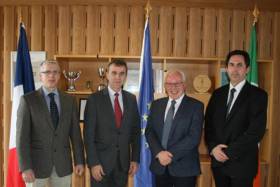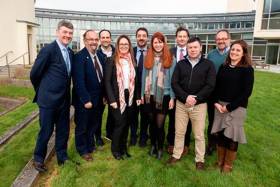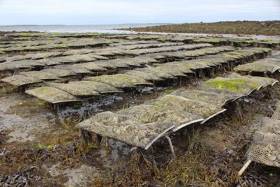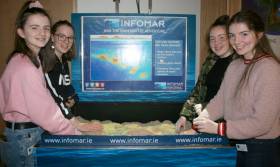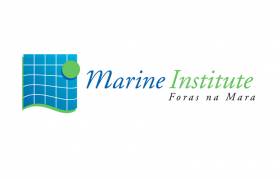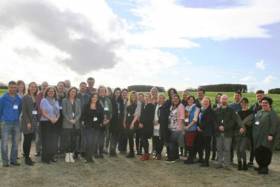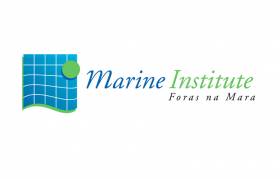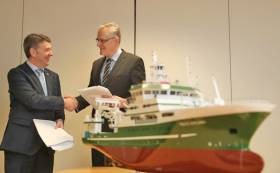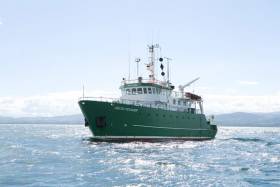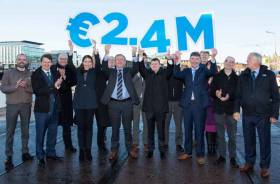Displaying items by tag: Marine Institute
French Ambassador Visits Marine Institute To Learn About Its Work & Future Strategies
The Marine Institute recently welcomed the Ambassador of France in Ireland, Stephane Crouzat, and Attaché for Science and Technology Marc Daumas to its headquarters in Oranmore.
The French delegation received a tour of the Marine Institute facility, and met with staff to gain an insight into the work of the institute and collaborations with French organisations.
Welcoming the delegation to the Marine Institute, Dr Paul Connolly, director of fisheries and advisory services, said: “We were delighted to have the opportunity to exchange knowledge and discuss our recent work and research with the ambassador.
“Our collaborations with French scientists and the French institute Ifremer and important relationships which also increase our research capacity.”
The ambassador was greeted by Dr Connolly and Thomas Furey of the INFOMAR programme, and introduced to the broad work of the institute using the various displays in the reception area.
Dr Connolly outlined the work of the institute’s marine science research vessels, and the design for a new state-of-the-art marine research vessel for Ireland which is now under way.
The ambassador also viewed a series of artworks and watercolour illustrations produced as part of BlueFish marine science project, which links art and science to demystify the concept of climate change in coastal communities.
Furey demonstrated how the INFOMAR Augmented Reality Sandbox is used to explain the concept of seabed mapping to children and adults at public events.
Experts from the Marine Institute shared their involvement in recent research and projects through a number of presentations.
Jennifer Doyle explained how underwater TV surveys assess nephrops stocks and how the Marine Institute has transferred this technology to the Bay of Biscay, by working closely with the French Institute Ifremer.
Furey discussed INFOMAR’s work and links with several French organisations, Guillaume Ball outlined his current research on tuna, and Yves Reecht explained how mobile phone technology was being used to build a system to map the fishing activity of small inshore vessels.
Aodhán Fitzgerald provided an overview on the Marine Institute’s role as co-ordinators of EuroFleetsPlus, a project which will access to an advanced research fleet and involve a number of French partners.
Dr Margaret Rae also presented the work undertaken by the Atlantic Ocean Research Alliance (AORA) as part of the transatlantic alliance between the USA, Canada and the European Union.
The French delegation also received an overview of Ireland’s Integrated marine plan Harnessing Our Ocean Wealth, and the Marine Institute’s Strategic Plan 2018 – 2022 Building Ocean Knowledge, Delivering Ocean Services.
A key building block in developing the institute’s digital capability as part of this strategic plan was achieved last month when it became one of the first 10 national data centres worldwide to receive the international accreditation of its Data Management Quality Management Framework by the (UNESCO) International Oceanographic Commission's IODE programme.
The IODE (International Oceanographic Data and Information Exchange) programme designates national oceanographic data centres and has a central co-ordinating role internationally.
New digital capabilities are critical to integrated marine service delivery including areas such as oceanographic services, food safety, fisheries and marine management programmes, the institute says, adding that the IODE accreditation “will underpin the quality of these services and underlines the Marine Institute's commitment to high-quality services”.
These services include the institute’s Digital Ocean programme which is developing new digital capabilities in data management, integration, analytics and modelling to contribute to making high-quality marine data and information more readily available to support service delivery to Government, the national marine research and innovation community, the public and to facilitate international collaboration.
#MarineScience - The EurofleetPlus Kick-off meeting held at the Marine Institute in Galway this past week (Tuesday 5 to Thursday 7 March) announced details of the project that will facilitate access to the largest advanced marine science research vessel fleet across Europe, Greenland, USA and Canada, Bermuda and New Zealand.
Building on the achievements of the two preceding Eurofleets projects, the Marine Institute is a co-ordinator of EurofleetsPlus, a consortium comprising 42 marine institutes, universities, foundations and SMEs from 24 countries across Europe, North America and Oceania, with funding of €9.9 million.
Welcoming Ireland’s leadership role in this major EU Horizon 2020-funded project, Marine Minister Michael Creed said: “This recognises the high standards of scientific and operational excellence which continue to be achieved by the Marine Institute and is particularly relevant in the strategically important arena of research vessels operations, where the Marine Institute’s RV Celtic Explorer operates over 300 days of the year.
“Ireland’s participation in international research partnerships such as EurofleetsPlus adds value to Ireland’s ocean research capacity and I congratulate the Marine Institute on its outstanding success rate of 40% in Horizon 2020 funding bids totalling €6.6 million since 2014.”
Involving trans-national activities, the project will prioritise research on sustainable, clean and healthy oceans, linking with existing ocean observation infrastructures, as well as support innovative ideas working closely with industry.
Aodhán Fitzgerald, RV operations manager at the Marine Institute and EurofleetsPlus project co-ordinator, said that the project will enable access to an unprecedented number of vessels providing a significant increase in ship time at sea.
“With a fleet of 27 state-of-the-art research vessels from European and other international partners, this is extremely exciting for marine researchers as they now have opportunities to access research vessels in the North Atlantic, Mediterranean, Black Sea, North Sea, Baltic Sea, Pacific Southern Ocean and Ross Sea, through the competitive calls process.”
In addition to ship time, marine researchers and scientists will also have the opportunity to work with the best marine equipment and marine infrastructure exploring the ocean in ways that have not been possible in the past.
This will include access to seven new remotely operated vehicles (ROVs) to capture video and samples from the deepest parts of the ocean. The researchers will have access to five autonomous underwater vehicles for collecting data relating to the ocean environment.
In addition, a unique mobile portable telepresence unit will also enable remote access by researchers and diverse end users including the public, which is a first for Europe.
Establishing a strategic roadmap and sustainability plan, EurofleetsPlus will extend and enhance the capabilities of the European research vessel infrastructure, bringing new perspectives, new ideas, and new research and innovation tracks that will be beneficial to all.
At the kick-off meeting, Fitzgerald added: “I am looking forward to working with established and new partners over the next four years. This trans-national project will provide us all with a unique opportunity to develop our networking activities, ensure robust call processes with booking ship-time, as well as increase our stakeholder engagement at a national and international level.”
EurofleetsPlus is funded under Horizon 2020 Integrating Activity for Advanced Communities with respect to Environmental and Earth Sciences - Research Vessels. The project has received funding from the European Union's Horizon 2020 research and innovation programme under grant agreement No 824077.
Oyster Farming Industry & Researchers Meet To Discuss Latest Knowledge On Oyster Health
The latest research and knowledge on oyster diseases was presented at a meeting on Pacific oyster health held recently by the Marine Institute’s Fish Health Unit.
The event attracted more than 80 participants from Ireland’s oyster farming industry, as well as representatives from Ireland’s seafood development agency Bord Iascaigh Mhara.
Presentations focused on mortality, disease management and current national and international research in oyster health.
Oyster mortalities in recent years in Ireland have been mainly associated with either Ostreid herpes virus-1 μVar (OsHV-1 μVar) infection or the bacterium Vibrio aestuarianus. Both diseases cause significant oyster mortality events and an economic loss to oyster farmers and producers.
Researchers from the Marine Institute and University College Cork presented the major findings from the REPOSUS project, funded by the Department of Agriculture, Food and the Marine’s FIRM programme.
The three-year REPOSUS project focused on reducing the impact of pathogens associated with mortalities in Pacific oysters. This included results from sentinel trials in disease impacted bays, molecular and pathogenicity characterisation studies on isolates of OsHV-1 and rache and studies on environmental parameters which influence mortality.
French institute IFREMER also presented the latest results from the VIVALDI project (Preventing and Migrating Farmed Bivalve Diseases) funded by the EU’s Horizon 2020 research and innovation programme.
VIVALDI combines European research resources to better understand shellfish diseases and improve the sustainability and competitiveness of the European shellfish industry. The Marine Institute is one of 21 partners involved in this research project.
Industry representatives from Ireland also shared their experience of managing losses in shellfish production due to oyster disease and mortality on their sites.
This feedback, along with research presented, will be used to update the current best practice guide for disease control and management in Ireland's oyster industry.
TY Students Dive Into Science At Marine Institute’s HQ
Last week the Marine Institute’s headquarters in Oranmore, Co Galway welcomed 22 Transition year students to its fifth annual TY training week.
Students from Galway, Mayo, Clare, Roscommon, Dublin and Waterford engaged in a range of STEM-related activities to experience what it is like to work in the marine sector.
The TY students shadowed scientists and staff at the Marine Institute, learning about marine science, technology and asasociated disciplines.
They also engaged in a range of presentations and interactive activities related to fisheries science, marine chemistry, seabed mapping, food safety, research vessel operations, maritime development, oceanography and marine climate, data, applications development, team-building and communications.
“Increasing students’ knowledge on the importance of our marine resource, is key to supporting Ireland's ocean economy, where highly skilled professionals are needed in the future,” said Marine Institute chief executive Dr Peter Heffernan.
“Our TY Week programme aims to inspire a new generation of marine professionals, and provides an insight into the diverse career opportunities on offer in Ireland’s marine sector.”
TY students from any school in Ireland are welcome to apply for this week-long, full-time work experience opportunity at the Marine Institute for 2020. Further details on the application process will be available later this year.
Seven renewable energy projects are benefitting from a significant funding injection following investment by the Marine Institute’s industry-led awards, as reported last month on Afloat.ie.
With the aim of driving innovation in the marine sector and accelerating renewable energy breakthroughs, funding of up to €200,000 was awarded to each of the research projects to be conducted by indigenous companies, with some including university partners.
Speaking at the funding announcement, Marine Institute chief executive Dr Peter Heffernan said: “The diversity of renewable energy projects benefiting from this funding demonstrates the innovation and expertise that we are developing in Ireland in this sector.
“From research on the impact of floating platform technology to subsea micro-piling to hybrid solar and wind energy devices, the commercial opportunities of these projects are very exciting. We are committed to supporting marine enterprises in Ireland to drive Ireland's blue economy.”
Gavin & Doherty GeoSolutions is being awarded €199,957 over two years for their research project in partnership with University College Cork that will involve a geological, geotechnical, sediment and morphodynamic assessment of designated areas of the Irish seabed.
Predictive sediment transport modelling, validated against field data, will be used to characterise future seabed changes and to quantify the risk for future potential offshore wind developments in the Irish sea.
The outcomes of the project will support developers in efficient design, installation and maintenance planning of offshore renewable assets and will reduce the risk associated with future wind farm developments in the Irish Sea.
Two projects in the area of floating energy platforms were also successful in their research funding applications.
Solar Marine Energy will receive €195,465 over two years, in partnership with UCC, to progress how solar energy can be harnessed on a floating platform to power an electrolysis unit to produce Hydrogen in an electro-fuel form while using battery storage for the release of power as and when required.
Solar Marine Energy Ltd (SME) is one of the first companies to design, engineer and manufacture cost-competitive floating solar energy products in its Floating Solar Panels, in accordance with maritime industry best practice.
To make floating wind a commercial reality, further technology innovation is necessary. The Eureka-Sea Wind project proposed by Marine Materials Ireland Ltd (MMI) will also receive €199,816 over two years to develop reliable and efficient floating wind turbine technology based on a novel concept that reduces cost and weight.
Based in Ireland and the USA, Resolute Marine Ltd has developed a successful Oscillating Wave Surge Converter (OWSC) flap system.
Now with a funding boost of €199,955, Resolute Marine will bring the OWSC from concept to robust design that is optimised for locations in the developing countries and islands targeted for commercial installations of RML’s innovative wave-powered desalination systems.
This project is set to advance the Irish wave energy industry and provide jobs for three additional highly trained experts in the fields of hydrodynamics, ocean engineering and project management.
Subsea Micropiles is being awarded €199,902 for research on the design and temporary installation of two demonstration micropile anchors.
The anchor frames will represent structures that would support the foundations of offshore wind turbines or hydrokinetic energy converters. The two anchors will be load tested both horizontally and vertically and the results compared with design predictions.
This type of micropiling technology for subsea environment provides a real and cost-effective alternative to current subsea micropiling models.
Use of robotically installed micropiles in the subsea environment represents important innovation and potential cost saving for marine renewable energy projects.
Fish farmers are actively searching for renewable energy sources to replace the diesel consumption, which causes concerns in relation to emissions and increases risk of oil spills when transporting diesel to the feed aquaculture barges.
Wind and solar generation on fish farm cages currently do not meet the power needs and can be fundamentally challenging and particularly high maintenance, when mounted so close to the ocean itself.
Wave energy, especially when coupled with the existing mooring system, is seen as a very appealing solution.
Exceedence and TfI Marine secured €199,532 in funding to research and develop a revolutionary 1kW Inline Gator system. The Inline Gator will harness the natural power of the waves by converting the motion of the fish cage into electricity thereby mitigating the need for fossil fuels.
W1DA Experience Ltd is also being awarded €198,763 in funding for the Marine EcoPowa Project in partnership with the University of Southampton and UCC.
The project aims to create a new generation of medium power (12-15KW/20-30HP) environmentally–friendly marine propulsion and energy regeneration systems that will replace what is currently termed as “outboard motors”.
The potential financial benefits to boat users in Ireland are significant, potentially costing less than half that of petrol and diesel motors over a 10-year lifetime.
The Marine Institute says it is committed to assisting industry-led development through knowledge transfer, capacity building and research to enable optimal decision making and planning to best leverage Ireland’s natural marine resources sustainably and efficiently.
This investment in marine enterprises is a key output of the Marine Institute Strategic Plan 2018-2022: Building Ocean Knowledge, Delivering Ocean Services, guided by the Government’s integrated marine plan Harnessing Our Ocean Wealth as well as the National Marine Research and Innovation Strategy 2017–2021.
Increased economic growth and job creation from small and medium-sized enterprises based in Ireland is a key component of several national strategies and regional development plans. Funding for these seven renewable research projects is being provided by the Marine Institute and the Government, co-funded under the European Regional Development Fund (ERDF).
Irish Ocean Literacy Network Meeting Shapes The Conversation About Our Oceans & Human Health
The Irish Ocean Literacy Network held its sixth national meeting last Wednesday 20 February at the Marine Institute in Galway, where keynote speakers Dr Easkey Britton — surfer and post doc fellow at NUI Galway — and filmmaker Ken O’Sullivan of Sea Fever Productions spoke about the importance the ocean has on our lives as islanders.
Speaking at the event as chair, Cushla Dromgool-Regan of the Marine Institute welcomed having two distinguished guest speakers, highlighting the importance of recognising Ireland’s rich maritime heritage and being able to share our stories.
“As an island nation we are extremely lucky to have a wealth of experts from all walks of life willing to share their experiences with the wider marine community,” she said.
“From being able to see a whale and its calf close up in Irish waters through Ken’s film work, to watching children learning to surf for the first time with Easkey, reminds us of the diversity and importance of our maritime heritage and looking after our ocean for future generations.”
Easkey Briton is widely recognised for her international achievements in surfing is currently completing a post-doctoral research fellow with the EU-Horizon 2020 project Seas, Oceans and Public Health in Europe (SOPHIE).
Growing up in a family of surfers, Easkey talked about how her life passion for the water has brought her in a full cycle, where much of her research as a social scientist has been about the environment and society.
“Bringing people together through community outreach to working with a range of stakeholders in my current research highlights how we all value the ocean in different ways, yet together we all seem to understand the importance of linking our ocean with human health,” Easkey said.
Filmmaker Ken O’Sullivan also spoke at the event sharing his love of the ocean. Coming from a family of fishermen and then learning to dive opened up a new world of discovery for Ken at a young age, where he stated “exploring the ocean as a child with no limitations was like living the life to what might be similar to Huckleberry Finn. Now making a career out of filming wildlife and creative documentaries in the most extreme environments has been a life of adventures.”
Ken O’Sullivan set up Sea Fever Productions in 2006 with Katrina Costello to produce wildlife and creative documentaries. In 2018 they produced Ireland’s Deep Atlantic, a hugely ambitious ocean natural history series searching for blue whales and cold water coral reefs in the deep waters of the North Atlantic, documenting habitats and whale and shark behaviour for the first time ever.
“I have worked with a range of people who have contact with the ocean from fishermen, whale watchers to marine researchers and scientists during their deep sea expeditions, [and] coupled with the development of filming technology, [it] has provided an incredible opportunity to capture footage of marine life right at our doorstep,” Ken said.
“The feedback from the public who have seen my work has been extremely rewarding, particularly from those who are seeing marine life in Irish waters for the first time.”
With a wide range of ocean champions promoting ocean engagement across the island of Ireland, the Irish Ocean Literacy Network says it has seen a significant growth in the last six months, with nearly 100 members representing individuals, small businesses, outreach and education specialists, researchers, NGOs, State agencies and Government departments throughout Ireland.
Garry Kendellen, secretariat of the network, said: “With the recent growth of the IOLN membership, it is encouraging see a sense of the ocean community in one room.
“Our network is a truly eclectic mix of people, who share a similar passion for the ocean. From community outreach to larger national collaborations, it is great to see so many members willing to share their experiences with the network, providing advice and inspiring new collaborations and ideas.”
During the strategic workshop run by David Murphy of AquaTT, he noted: “As an island nation we are in a unique position to help contribute to the national and international efforts to increase peoples understanding and engagement about the ocean.
“We are all individuals who bring something new to the network, yet working together as a collective highlights the importance of creating impactful actions and messaging promoting our ocean from coast to coast.”
The Irish Ocean Literacy Network holds four membership meetings per year where attendees are able to meet other ocean champions who are keen to raise awareness and engagement about the ocean in Ireland. Membership is currently free and if you are interested in learning more, contact [email protected].
The Marine Institute are funders of the Irish Ocean Literacy Network secretariat, which was awarded to Galway Atlantaquaria from 2018-2020. This aims to supports the institute’s Strategic Plan 2018-2022, Building Ocean Knowledge – Delivering Ocean Services, as well as the Government’s marine strategy Harnessing Our Ocean Wealth, whereby it aims to increase awareness of the value, opportunities and societal benefits of our ocean, as well as raising peoples engagement with the ocean.
Robotics, Internet of Things and data analytics are set to play a key role in Ireland's blue economy, according to the Marine Institute.
The national funding agency for the marine research industry recently awarded financial investments in two marine technology projects led by Xocean and IDS Monitoring.
Louth-based marine technology firm Xocean has been awarded €199,739 in funding over two years to transform marine monitoring and data collection.
The company uses innovative robotics, particularly unmanned vehicles, and IoT technology to monitor and collect data at sea.
Elsewhere, a new smart data buoy project by Clare-based IDS Monitoring will also benefit from a €196,955 funding grant, to develop a new smart buoy for coastal and inshore environmental monitoring.
The new IDS Buoy will make it easier to assemble, deploy and use buoys, as well as reducing purchase costs and maintenance, whilst enhancing the value of the information delivered through the smart buoy.
Recently announced by the Department of Agriculture, Food and Marine, the industry-led awards support Ireland's Integrated Marine Plan, Harnessing Our Ocean Wealth, as well as the national Marine Research and Innovation Strategy 2017-2021.
“Supporting Irish companies in the marine sector, through research grants, helps to accelerate innovation and drive growth in our blue economy,” said Marine Institute chief executive Dr Peter Heffernan.
“The Marine Institute is committed to assisting industry-led development through knowledge transfer, capacity building and research to enable optimal decision making and planning to best leverage our natural marine resources sustainably and efficiently.
“Both advanced technology research projects funded through the Marine Institute have the potential to be globally significant, and present enormous commercial opportunities for these Irish marine enterprises.
“Increased economic growth and job creation from small and medium sized enterprises based in Ireland is a key component of several national strategies and regional development plans.
“These awards will be carried out with the support of the Marine Institute under the Marine Research Programme 2014-2020 funded by the Irish Government, co-financed by the European Regional Development Fund.”
#MarineScience - Ship design consultants Skipsteknisk AS of Ålesund, Norway have been awarded the contract to design the new state-of-the-art marine research vessel for Ireland.
The new 50m research vessel due in 2022 will replace the RV Celtic Voyager and will be a sister ship to Ireland’s largest research vessel, the 65m RV Celtic Explorer.
It will also form a critical part of the State’s maritime infrastructure, supporting the Government’s national integrated marine plan, Harnessing Our Ocean Wealth, as well as the National Marine Research and Innovation Strategy.
In the more immediate term, the new vessel will help address research challenges resulting from Brexit and the Common Fisheries Policy, as well as climate-induced impact on the oceans.
“There are many challenges posed and threats in relation to our oceans and research is an intrinsic part of formulating a sustainable approach to the use, understanding and management of our oceans,” said Marine Minister Michael Creed.
“The funding of the new vessel demonstrates the Government’s commitment to expanding and strengthening marine science in Ireland to ensure our nation is equipped with the best scientific advice possible to enable a strong negotiating position and to maximise economic opportunities in a sustainable manner.”
Dr Peter Heffernan, chief executive of the Marine Institute, welcomed the signing of the research vessel design contract following an extensive EU tender process.
“The institute is on track and on budget with the design of the new vessel, which will provide critical national infrastructure and marks a major milestone in the Marine Institute's efforts to provide world-class marine science.
“The significantly enhanced capabilities of the new research vessel will help researchers, educators, students and the public gain a richer understanding of our ocean and will facilitate exploration that will lead to discoveries that stretch the bounds of our imagination.
Dr Heffernan added that “this significant investment in the nation’s scientific research recognises the Marine Institute's quarter-century of leadership in the field of oceanography and its long-standing and fruitful collaborations with partner institutions.
“The new vessel will enable us all to more efficiently explore, collaborate, and conduct global ocean research.”
Based in Galway, the vessel will be used by the Marine Institute and other State agencies and universities to undertake fisheries research, seabed mapping, oceanographic and environmental research and surveys, as well as student training.
It will also allow for continued transatlantic surveys with international partners through the Atlantic Ocean Research Alliance (AORA) and EU funded-survey programmes obtained through Horizon 2020.
Skipsteknisk AS are specialists in the design of highly advanced ships and are recognised internationally as leading designers in the research, fishing and offshore sectors.
The nature of marine equipment has changed significantly since the launch of Ireland’s first research vessel, the RV Celtic Voyager back in 1997
That’s according to Mick Gillooly, director of ocean science and information services with the Marine Institute.
“The new research vessel will be 50m long and will feature state-of-the-art technologies enabling a wide range of work including ocean monitoring, fish stock assessment and seabed surveying. This new vessel will be a silent research vessel, and will be designed to meet the stringent criteria of the ICES 209 noise standard for fisheries research.
“In addition, the vessel will be designed to operate in the harsh conditions encountered in the NE Atlantic and will be able to spend 21 days at sea. It will also support the remotely operated vehicle (ROV) and autonomous underwater vehicle operations, which enable the exploration of our deep ocean down to 3,000m.”
Once the design phase is complete, the next phase is to tender for a shipyard to construct the vessel. This is expected to be complete by the end of this year, with delivery of the new vessel expected in early 2022.
Applications Close Tomorrow For Eurofleets Plus Temporary Team Leader Role With Marine Institute
There’s still time to apply for the Marine Institute’s vacancy for a temporary team leader for its Eurofleets Plus and Marine Robots projects.
Applications close at noon tomorrow, Monday 28 January for the position, in which the successful candidate will act as project manager for the Eurofleets Plus project.
Eurofleets Plus is a four-year advanced community research infrastructure project which has been awarded funding via Horizon 2020, and aims to unify oceanic research fleets across Europe for shared purposes and common goals.
Among other requirements, the Marine Institute is looking for applicants with degree in a scientific or technical subject am with a proven background in working in marine research projects, ideally in a co-ordination capacity.
The Marine Institute website has more on the role and how to apply HERE.
Marine Institute €2.4m Investment in Industry-Led Marine Projects
Twelve marine SMEs are to benefit from funding provided for the National Marine Research and Innovation Strategy (2017-2021).
The Minister for Agriculture, Food and Marine, Michael Creed TD has announced that the Marine Institute is to provide twelve marine businesses (in collaboration with five universities) with investment funding totalling €2.4 million over 3 years. The funding is being provided to drive continued innovation in Ireland’s ocean economy, a key requirement of the Marine Institute led, National Marine Research and Innovation Strategy (2017-2021). The twelve grants of up to €200,000 each which are being provided to individual companies and company-led consortia will support novel R&D and the development of new technologies in key growth areas such as marine engineering, renewable energy and the blue bioeconomy.
Minister Creed said, “Ireland’s blue economy continues to grow and develop in line with the targets of the national integrated marine plan, Harnessing Our Ocean Wealth. Indigenous small and medium enterprises are identifying new commercial opportunities across a range of marine sectors which can lead to economic growth and new jobs. These industry-led awards provide the opportunity for companies to build their R&D capacity and to innovate towards new products and processes. I look forward to seeing the twelve successful companies develop and grow their businesses with the support of this significant public investment funding.”
Marine Institute CEO Dr. Peter Heffernan said, “The Marine Institute is committed to assisting industry-led development through knowledge transfer, capacity building, research and Innovation. This investment in industry-led research is a key deliverable of the Marine Institute Strategic Plan 2018-2022: Building Ocean Knowledge, Delivering Ocean Services. Job creation in the marine sector is increasing as a result of such investment and Irish marine companies have built an excellent reputation internationally for innovation and best practice. The 12 companies receiving funding through this funding call have demonstrated the demand and capability to fuel further growth through marine research,”
Increased economic growth and job creation from small and medium sized enterprises based in Ireland is a key component of several national strategies and regional development plans. These awards will be carried out with the support of the Marine Institute under the Marine Research Programme 2014-2020 funded by the Irish Government, co-financed by the European Regional Development Fund (ERDF).
A diverse range of companies applied to the Marine Institute, following the launch of its Industry-led call in May 2018. Awards have been approved for companies operating in a range of marine sectors including companies such as SolarMarine Energy, Gavin & Doherty Geosolutions, Subsea Micropiles, Marine Materials Ltd, Exceedence Ltd, w1Da Experience and Resolute Marine. Bioresources processing company, Bio-marine Ingredients Ltd, was awarded funding, while advanced technologies companies, Xocean Ltd and IDS Monitoring and marine engineering companies Technology from Ideas and Ocean Energy were also successful in their funding applications. See full list of grants awarded below.
|
Project Title |
Lead Organisation (Company) |
Project Partners |
Total Project Funding Awarded |
Main Research Theme (National Marine R&I Strategy) |
|
Development of marine functional food to support muscle health and healthy aging in older adults |
Bio-marine Ingredients Ireland Ltd |
Dublin City University & University of Limerick |
€200,000 |
Bioresources: Processing for Food & Other Use |
|
Aquamoor |
Technology From Ideas Ltd |
Not Applicable |
€199,960 |
Bioresources: Aquaculture |
|
A Morphodynamic Study of the Irish Sea |
Gavin & Doherty Geosolutions |
University College Cork |
€199,957 |
Renewable Energy |
|
Development of the next generation fisheries surveys using a "swarm" of Unmanned Surface Vessels |
Xocean Limited |
Not Applicable |
€199,739 |
Advanced Technologies |
|
Floating Solar Hybrid Energy Project |
SolarMarine Energy Ltd |
University College Cork |
€195,465 |
Renewable Energy |
|
Eureka-SeaWind: A lighter, more cost-effective solution for floating offshore wind |
Marine Materials Ireland Ltd |
Not Applicable |
€199,816 |
Renewable Energy |
|
The IDS Smart buoy Project |
IDS Monitoring Ltd |
Not Applicable |
€196,275 |
Advanced Technologies |
|
OWSC - Designing for Manufacture, Deployment, Operation, Maintenance and Decommissioning |
Resolute Marine |
Not Applicable |
€199,955 |
Renewable Energy |
|
Development of Micropile Technology for Subsea Environment |
Subsea Micropiles Ltd |
Not Applicable |
€199,902 |
Renewable Energy |
|
1kW Inline Gator - aquaculture application |
Exceedence Ltd |
Technology From Ideas Ltd |
€199,532 |
Renewable Energy |
|
Engineering Advanced Materials for Marine Energy and Aquaculture applications. |
Ocean Energy Ltd. |
NUI Galway |
€195,565 |
Engineering |
|
Marine EcoPowa Project |
w1Da Experience Ltd |
University College Cork & University of Southampton |
€198,763 |
Renewable Energy |
Total Grant-Aid Funding Awarded €2,384,929





























